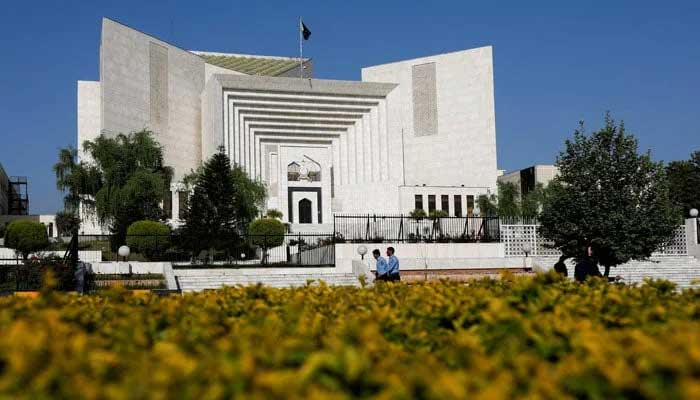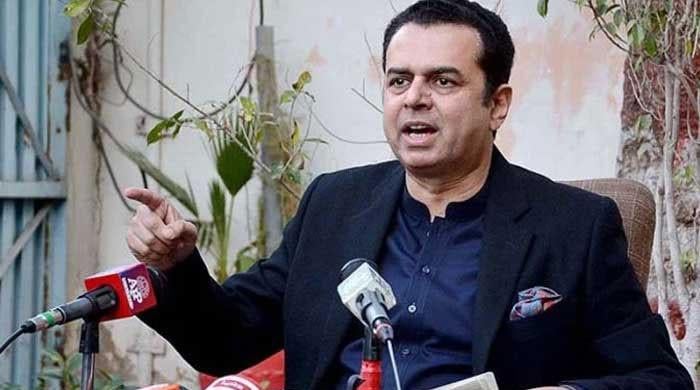AGP directed to submit record of NA proceedings on SC bill by tomorrow
SC adjourns hearing of pleas challenging bill clipping CJP's powers for three weeks, says more arguments required in the case
May 08, 2023

- PML-N, AGP seek formation of full court in SC bill case.
- Bench questions motives behind govt's demand of full court.
- CJP Bandial says "issue was not a case of constitutional amendment"
The Supreme Court (SC) on Monday directed the Attorney General for Pakistan (AGP) Usman Mansoor Awan to submit the record of National Assembly's proceedings on the judicial reforms by tomorrow (Tuesday).
The direction from an eight-member larger bench came today during a hearing of the pleas challenging the Supreme Court (Practice and Procedure) Bill 2023.
An eight-member larger bench of the apex court headed by Chief Justice of Pakistan (CJP) Umar Ata Bandial and comprising Justice Ijaz ul Ahsan, Justice Munib Akhtar, Justice Sayyed Mazahar Ali Akbar Naqvi, Justice Muhammad Ali Mazhar, Justice Ayesha A Malik, Justice Syed Hasan Azhar Rizvi and Justice Shahid Waheed, was hearing the pleas.
On the previous hearing, CJP Bandial had turned down the attorney general's plea to withdraw the stay order restricting implementation on the bill, which the top court had passed on April 13.
The court had also sought the NA proceedings records on the previous hearing, which couldn't be presented today.
Today's hearing
At the outset of the hearing, Attorney General of Pakistan (AGP) Mansoor Usman Awan requested the bench to constitute a full court to hear the pleas. Meanwhile, Pakistan Muslim League-N's (PML-N) lawyer Salahuddin Ahmed also informed the court that they have also filed a similar plea seeking the formation of a full court.
During the hearing, the bench questioned the motives behind the government's demand of a full court.
The top judge remarked that the court had to decide for future, the circumstances in which the bench can order the constitution of a full court.
"The current issue was not a case of constitutional amendment," CJP Bandial observed.
He directed the parties to present examples of cases other than presidential references on Justice Faez Isa and Justice Iftikhar Chaudhry, if any.
The case cannot be concluded today as it requires further assistance and arguments from other parties, the top judge remarked while adjourning the hearing for three weeks. He said that some members of the bench were going out of city therefore the hearing was being adjourned for this long.
The bench also directed the lawyers to tell if they had confidence in the current bench or not, and if this was the case then this matter should be sorted first before.
Earlier, when the AGP started his arguments, CJP Bandial inquired if he had submitted the record of the National Assembly’s proceedings.
Regarding the query, the AGP said that they expected the records to be received by tomorrow (Tuesday). He informed the court that they had contacted the National Assembly Speaker’s office in this regard.
AGP Awan argued that the court had declared that the basic structure of the Constitution was present. The judicial reform law involves the matter of the formation of benches and appeals, he said.
The bill also gives the right to change the lawyer, he added.
He further stated that the matters decided in the bill were of administrative nature and the Supreme Court (Practice and Procedures) Act, 2023, could be amended by a full court.
He said that cases related to the independence of the judiciary and rules should also be heard by a full court.
Moreover, the law will also apply directly to judges who are not hearing the case.
At this, Justice Ahsan remarked that the question was not about the amendments, but whether there were such legislative powers or not.
Meanwhile, Justice Naqvi inquired if there had been any legislation like the bill in question in the past.
At this, the AGP maintained that the president's permission was required to make the rules until 1973.
Responding to this, Justice Naqvi objected that how can such a legislation be done in the presence of Article 191 of the Constitution.
Meanwhile, Justice Mazhar remarked that the government's plea had stated that this case was the "first case of its kind".
Background
The bill aimed at regulating the powers of the CJP, was approved by the Parliament during a joint sitting on April 10.
The National Assembly, on April 21, notified the Supreme Court (Practice and Procedure) Bill 2023 as an act.
The bill's implementation was halted by the same bench hearing the case today.
The top court on April 13 had stopped the implementation of the law observing that if the law received the assent of the president, the bill would not be acted upon in any manner till further order.
“The moment that the Bill receives the assent of the President or (as the case may be) it is deemed that such assent has been given, then from that very moment onwards and till further orders, the Act that comes into being shall not have, take or be given any effect nor be acted upon in any manner,” read the nine-page interim order issued on April 13.
In its order, the bench stated that the facts and circumstances presented here are extraordinary both in import and effect.









